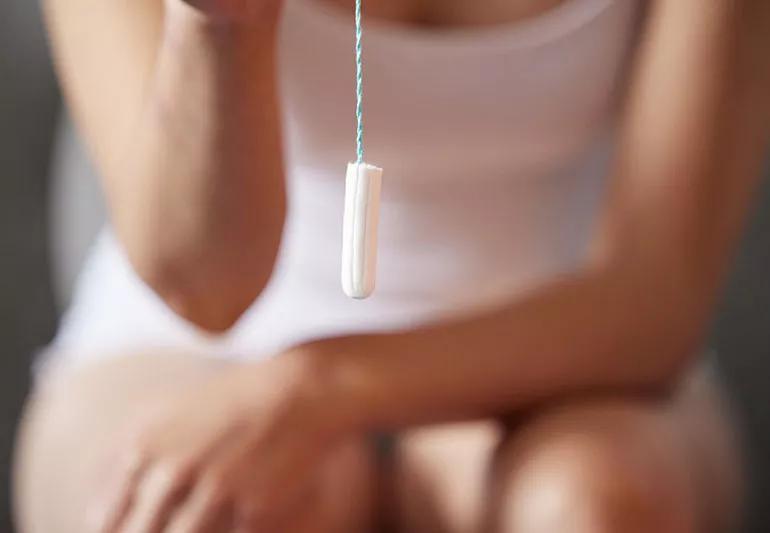Use them within five years and store them someplace cool and dry

Image content: This image is available to view online.
View image online (https://assets.clevelandclinic.org/transform/837f4425-582d-4e14-b631-c4a84a25e963/tampon-expire-1343545472-770x533-1_jpg)
Unrecognizible person in bathroom holding tampon dangling from hand.
Everyone loves a good sale, but hold off before you stock up on enough half-price tampons to get you through a decade’s worth of heavy periods.
Advertisement
Cleveland Clinic is a non-profit academic medical center. Advertising on our site helps support our mission. We do not endorse non-Cleveland Clinic products or services. Policy
As it turns out, tampons actually have an expiration date — and using them after they’ve expired can have consequences for your vagina that you’d surely rather avoid.
They can, yes. And while it might seem a little weird that a device made of cotton, plastic and cardboard has an expiry date, hear us out.
Just like so many other materials, cotton is prone to becoming bacteria-laden and moldy over time. And if you store your tampons in a bathroom that also has a shower in it, you’re unwittingly creating the perfect breeding ground for bacteria and mold to take hold.
“Bacteria thrive in wet, moist places,” says women’s health specialist Sara Youngblood, CNP. “You might never have thought about whether tampons could develop mold, but it can happen, especially if you store them someplace damp or clammy.”
Tampons are good for about five years, but there’s a catch: If you store them someplace moist (again, like in your bathroom), they’re more likely to mold before their expiry date.
“Usually, people use their tampons well before they hit that five-year mark, which means the risk of inserting a moldy one is pretty low,” Youngblood says, “but it’s definitely something worth being aware of.”
Tampons are considered medical devices, so they’re regulated by the U.S. Food and Drug Administration (FDA). And though the FDA doesn’t require tampon brands to include expiration dates, many brands choose to. In these cases, you can tell when your tampons expire by checking that date on the box.
Advertisement
Here’s the thing, though: Aside from that, you probably won’t notice if a tampon has expired before you put it in your body.
“A tampon that has gone bad would start to mold on the absorbent core,” Youngblood says. “That is to say, it would happen on the inside of the tampon, where you can’t see it before you insert it into your vagina.”
Of course, keep an eye out for any weirdness. If you unwrap a tampon that smells funny or looks discolored — or seems anything other than fresh and clean — don’t use it.
If you’re putting something in or around your vagina, you want to be sure it’s in good shape. So, what about other period products?
Your vagina is a sensitive place. Any change in bacteria can get things out of whack, and that certainly applies to inserting a moldy tampon.
It’s possible that if you accidentally insert an expired tampon, nothing will happen at all. But it could also cause some unpleasant symptoms, like:
“Most of the time, these symptoms will subside once your period ends and your vagina’s natural pH is restored,” Youngblood notes, “but it’s better not to risk letting that bacteria into your body in the first place.”
If you’re experiencing these symptoms and they don’t seem to be going away, make an appointment with a healthcare provider to get things checked out. Be sure to let them know if you suspect a moldy tampon might be to blame.
Trying to keep your tampons in tip-top shape for as long as possible? Youngblood shares a few suggestions.
Advertisement
“At the end of the day, expired tampons shouldn’t rank too high on your list of overall health concerns,” Youngblood reassures, “Unless you’re buying tampons in bulk, you’re likely to use them well before their expiration date.”
Instead, focus more on making sure you know how to properly use a tampon and on protecting yourself from toxic shock syndrome.
Advertisement

Sign up for our Health Essentials emails for expert guidance on nutrition, fitness, sleep, skin care and more.
Learn more about our editorial process.
Advertisement
It’s important to angle it toward your rectum or back, along the natural curve of your vaginal canal
Yes, you can pee with a tampon in; no, they won’t stretch out your vagina or make cramps worse!
Nothing scented should go in or around your vagina!
It depends on your menstrual flow, and a little trial and error
Yes, with the right absorbency level and maximum time-frame
Homemade doesn't always mean safe
From using one at night to how often you should change them
In addition to toxic shock syndrome, you risk other vaginal infections
Prioritize your health by managing stress, strengthening your social connections and getting quality sleep
Bolsters, blankets, pillows and blocks can offer extra support, stability and comfort
Allergies, postnasal drip, asthma or reflux could be to blame for a cough that won’t quit